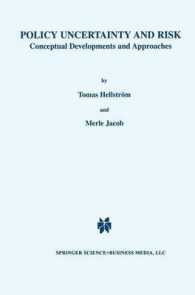- ホーム
- > 洋書
- > 英文書
- > Philosophy
Full Description
A timely new interpretation of Nietzsche's politics which reconciles the apparent contradictions in Nietzsche's texts by defining his politics as "ethical libertarianism."
Nietzsche's politics has been the subject of much debate, with the existing scholarship largely divided between aristocratic and anti-democratic readings on the one hand, and democratic readings on the other. This book takes its place in the emerging trend of trying to find a "third way" by arguing that Nietzsche's philosophy implies a form of libertarianism. This interpretation emphasizes individual self-transformation and the need to organize society in a way which best facilitates this for its members. While libertarianism is closest to Nietzsche's requirements, it needs to be reformulated to be made fully consistent with his philosophy. This requires a rejection of any grounding of the natural rights of the individual, presumed to be equal for all, in a metaphysical conception of the self. A Nietzschean "ethical libertarianism" would be based on protecting equal access of individuals to conditions which promote self-cultivation. It is thus democratic, but also meritocratic, as rights will be seen to accrue on the basis of individual development.
Contents
Foreword by Ashley Woodward
Preface
List of Abbreviations
Introduction
Part One: Nietzsche's Ontology
1. Nietzsche's Concept of the Self
2. One's Relation to the Self
3. Becoming and Will to Power
4. Reinterpreting the Will to Power, Becoming, and Nietzsche's Ontology
Part Two: Nietzsche's Ethics
5. The Self as Perspectival and Interpretive
6. The Role of Opposition and Overcoming in the Self
7. Eternal Recurrence and Amor Fati as Interpretive Mechanisms for Overcoming
8. Self-Cultivation and Life-Affirmation
9. Traits for Self-Cultivation
10. Free Spirits
11. The Übermensch
12. The Social Fabric, Culture, and the Individual
13. A Possibility for Anyone
Part Three: Nietzsche's Politics
14. Political Aristocratism
15. Nietzsche contra Democracy in General
16. Democratic Liberalism
17. Democratic Conservatism
18. Ethical Libertarianism
Conclusion: Life-Affirmation
Bibliography
Index








